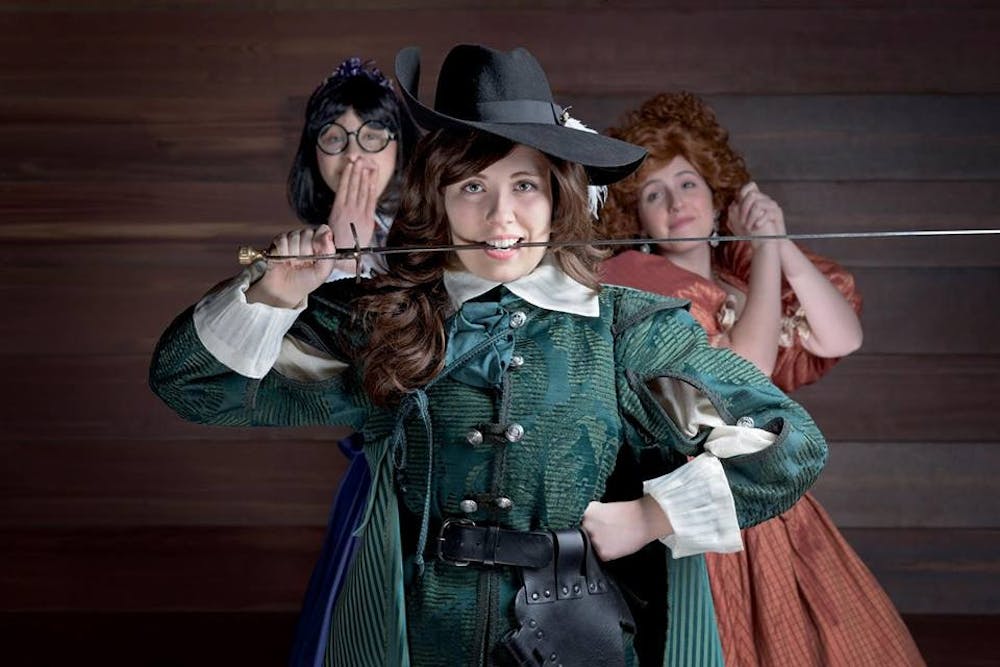When author and essayist Richard Wright published “Native Son” in 1940, the text was instantly labeled a “protest novel.” The book — which details the moral unraveling of a young, black man maneuvering poverty in the South Side of Chicago in the ‘30s — is revolutionary in that it succumbs to the exact racial tropes which it aims to expel. His prose contends that black humanity, which is multifaceted and nuanced, is as susceptible to the creeping hand of sin as all other racial categorizations. In displaying the villainous behavior of 20-year-old laborer Bigger Thomas, Wright calls attention to prejudice’s very presence, leading his audience to question — and ideally resist — its existence.
The feat of complicating stereotypes attached to oppressed groups has been taken on by dramatists as well as novelists, and this form of artistic political protest has transcended intersectional dividers within the white patriarchy. In presenting a week-long run of the play “Love’s A Bitch” in Ruth Caplin Theatre, the University’s department of drama aligned itself with this consciousness-boosting artistic movement. Instead of seeking to deflate racialized tropes such as in the style of Wright, the show aimed to contest and dismantle sexist oversimplifications in cultural representation by centering its narrative around a powerful — yet flawed — female protagonist.
Adapted in response to Baroque Spanish playwright Tirso de Molina’s “Don Gil de las calzas verdes” (or “Don Gil of the Green Breeches”), the show may be classified as a tragicomedy — unveiling the trials and triumphs experienced by the tragic heroine Doña Juana. Heartbroken and regrettably impure, Juana flails to regain the affections of her bumptious lover Don Gil who abandons her in pursuit of a more affluent Doña Ines. Juana is therefore driven to exercise her clout, opting to assume a male disguise — in a courteous nod to Shakespeare’s “Twelfth Night” and win Ines’s romantic interests over Don Gil as revenge for his neglect.
The play’s dramatic progression — embossed by an undistracting stage layout of a bare base and vertically-gapped, wooden slats — and the subsequent commentary it pushed served as the production’s driving engine. Although technical embellishments like puffed pantaloons, feathered top hats and disco-reminiscent light routines aided in compounding the show’s comedic overtone, an otherwise semi-stripped directorial approach cast the spotlight on exchanged dialogue and character development.
While facilitating a castwide discussion during an early rehearsal, the show’s playwright and Director David Dalton supplied a staggering response to the question, “How do you want people to feel when they leave the theatre?” Fourth-year Drama major and lead actress Mimi Robinson recalled his answer as being blunt — “uncomfortable and disturbed.”
Although in constant dialogue with a text crafted in and around 17th-century Spain, the play grappled with considerably modern and largely applicable sociopolitical content, ranging from renderings of gross female empowerment to homoerotic experimentation. The play managed to juggle these moving parts by funneling its drama through a comedic lens. Robinson identified the show’s tragicomic jabs as being intended to “kick people in the gut” — to make a viewer laugh, then pause and ponder, “Do I really think that’s funny?”
Doña Juana comes to rue what she identifies as her biggest mistake — placing her faith in a man. After becoming drunk on the power of winning over countless characters’ sexual affections, Juana takes advantage of the vulnerable Doña Clara’s advances for no sake other than selfish gratification. Her actions hence prompt audience members to question her moral compass and gawk at the normalization of such abuse when the gender roles are reversed.
Although Robinson did not consider it rare to see all-powerful female leads dominate the stage, she conceded it was indeed unusual to encounter emotionally layered and morally complex female protagonists in the theatrical sphere. The show’s intense interest with nuanced representation hinges on a drive to contest dehumanizing oversimplification in a system which overvalues clear-cut social roles. The production’s violent final image — the framing of an ultimately powerless Juana’s writhing body between two looming men in hoods — offers a shocking slap, momentarily casting aside the comedic crutch for a replacement of painful realism. Juana is stripped of any and all agency in defining the course of her future. The abduction of Juana’s ability to choose is the exact reality countless women continue to face, and Dalton presents this disconcerting truth by occupying the fragile space in the female experience where hope and despair intersect.
Robinson hailed the nine-person cohort as the “best cast she’s ever worked with,” citing instances of “deep thinking and conversation” engaged in behind the scenes. These discussions laid a foundation upon which the cast could pose questions about interlocking systems of oppression in a cleverly delicate manner.
Riding off the momentum of the unapologetic female protest displayed in last season’s “We Are Pussy Riot Or Everything Is P.R,” the drama department’s production of “Love’s A Bitch” managed to contribute a fresh dimension to questions of gender-based disparities in society. The show not only established itself as directorially deliberate and impeccably cast, but it did impactful work to humanize women as a collective body. Dalton aimed to demonstrate how even the highest levels of cunningness and ingenuity can exist alongside — and even motivate — poor judgment calls. His success in that realm is resounding.







